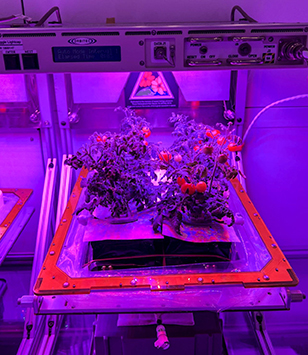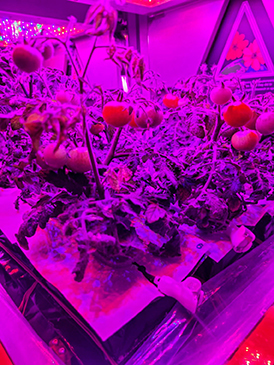NASA Explores New Crop Growth Aboard ISS Using Two Profile Products Technologies
The Veggie team experiments on ISS are part of NASA's effort to provide "Space Plant Biology" of sustainable fresh food production, grown with Profile® Porous Ceramics and Florikan® controlled release fertilizer
 |
 |
| Photo credit: NASA. These preflight images show the Red Robin dwarf tomato used for Veg-05 growing in Veggie hardware blended with Profile PPC and Florikan CRF at the Kennedy Space Center. |
In a historic moment that could positively impact the future of food production, tomatoes will be grown in space for the first time thanks to the product solutions and technical expertise of Profile® Products, a leading developer and manufacturer of highly engineered specialty agriscience materials. The Red Robin tomato trials, which arrived at the International Space Station (ISS) on November 26 as part of the SpaceX CRS-26 cargo mission, will be grown in Profile® Porous Ceramics (PPC) and Profile-produced Florikan® controlled release fertilizer for improved plant health and growth.
The Red Robin tomatoes will be fertilized with a proprietary blend of Florikan CRF 14-4-14 T 180 day and T 100 day. The blend will be further supplemented with a Florikan high potassium flowering special 0-0-19+9% Mg T 70 day flowering plant finisher in a controlled release fertilizer matrix. PPC provides the plant with a stabilized growing media to enhance the root zone for improved germination, increase oxygen levels, and improve water and nutrient retention.
The Red Robin tomatoes will also be grown on Earth as a controlled experiment using the same Florikan CRF and blends of PPC in school and home gardens as well as in KSC ground control labs. The crops will be compared to measure the effects of a zero-gravity environment on tomato growth. This will serve as a means to promote best management practices for sustainable agriculture on Earth.
“Whether on Earth or in space, our agriscience products and professional teams are ready to take on the challenge of providing a reliable growing solution when it matters most,” said Wes Martin, Profile’s vice president of horticulture/lawn and garden. “Through these trials, we hope to show that our products can grow nutritious food in unique conditions. The positive impact of such an efficient production system as what’s being used in space could reduce fertilizer applications in hydroponics, greenhouses and nurseries on Earth, resulting in less labor and reducing environmental run off.”
The study, NASA’s VEG-05 experiment, is designed to provide healthy and nutritious diets for astronauts on long-duration exploration missions. It will focus on several factors, including fertilizer and light spectrum on fruit production, microbial food safety and the overall behavioral health benefits of having plants and fresh food in space. In initial ground testing, the dwarf cherry tomato variety grew well in Profile’s products and produced a large crop.
For decades, Profile’s products have been used in several innovative trials in space. Recently, the products have been used as part of chile pepper production on the ISS, which helped inform the tomato study happening now. Additionally, Profile Porous Ceramics and Florikan CRF have been used for studies with NASA’s Vegetable Production System, or “Veggie,” to successfully produce a variety of leafy greens using Florikan 18-6-8.
Article Source: Melissa Gaskill, ISS Program Research Office, NASA; with editing by Ana Guzman and Ed Rosenthal, Space Technology Hall of Fame

